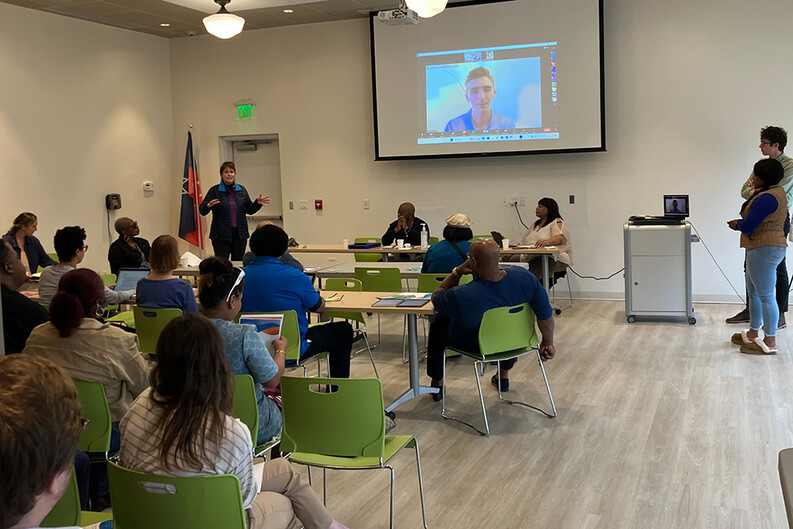Clinic Aims to Co-Create New Approach to Environmental Justice

Environmental justice is receiving unprecedented attention from all levels of government, including through new federal programs4 and the Biden administration’s Justice40 initiative5. But many environmentally burdened communities struggle to navigate the complex environmental policy landscape and access much-needed government resources.
The Goldman-Sonnenfeldt Environmental Protection Clinic6 (EPC) at Yale Law School is trying to change that. The clinic has partnered with Elevate Policy Lab7 of the Yale School of Public Health and the Yale Child Study Center, Yale School of Medicine to build out a new model of environmental justice practice grounded in civic engagement methods.
“The fact that new resources are available does not necessarily mean they are accessible for communities with environmental justice concerns,” said Law School student Ben Menke ’25. “Our project responds to the need for communities to engage in decision-making processes at many levels of government, which strengthens their efforts to develop solutions based on their own vision.”
The proof of concept is in the partnership’s work with the East End Neighborhood Revitalization Zone8 and the East End NRZ Market and Café9, two groups in east Bridgeport working to address environmental, economic, and health challenges faced by the community. Led by Deborah Sims, NRZ member and Community Champion with the Market and Café, the East End groups are rehabilitating a long-neglected brownfield site into a hydroponic farm and community wellness center via the “Mount Trashmore to Mount Growmore” project. The EPC and Elevate Policy Lab are supporting that effort, with crucial collaboration from the U.S. Environmental Protection Agency and the Connecticut Department of Energy and Environmental Protection.
“Community healing comes from the trusted partnership between our community and those who support our vision from the EPC, Elevate, and environmental agencies,” said Sims. “With our understanding of the laws and resources dedicated to environmental justice, the East End is transforming a huge environmental, health, and economic burden into a vibrant community strength.”

Earlier in May, students from the clinic presented their work at the NRZ’s monthly meeting. The deliverables included community education materials, a grant-writing template, and research and analysis on environmental policies relevant to the Mount Growmore project.
A guiding principle of the project is that communities impacted by environmental harms are best qualified to envision effective solutions. Students from the clinic play a supporting role, helping to bring the community’s vision to fruition.
“It was powerful to witness their passion and skills as advocates and organizers for action,” said Yale School of the Environment student Kaley Casenhiser ’24. “It is clear that that ‘special sauce’ of the East End is love — the love they have for one another and their home-places they desire to protect.”
The project takes an interdisciplinary approach, bringing together students from the Law School, the School of the Environment, and the School of Public Health to holistically address challenges.
“My biggest takeaway has been seeing what a powerful tool the law can be for communities,” commented Yale School of Public Health student Hannah Beath ’23. “My thinking about advocacy has changed completely and I think it’s incredibly important to understand the law in order to address health injustices and create more equitable policies.”
Elevate Policy Lab and the EPC intend to scale their efforts to other communities across the New England region.
“Triple bottom line — environmental, health, and economic — justice becomes reality when communities bearing the burden of pollution, disease, poverty, and violence effectively engage in government decision-making and secure resources to diagnose and develop solutions based on their own experience and vision” said Suzi Ruhl, Director of Policy at Elevate and co-supervisor of the clinic project. “Thanks to the dedicated team, this is happening in the East End. This is justice in action!”


